Module 7 Unit 3 Language in use (第二课时)课件 (外研版八年级上)
外研版英语七年级上册Module 7 Unit 3《Language in use》教学设计

外研版英语七年级上册Module 7 Unit 3《Language in use》教学设计一. 教材分析外研版英语七年级上册Module 7 Unit 3《Language in use》主要讲述了日常生活中的交际用语,包括问候、介绍、道别等情景。
本节课的内容与学生的生活紧密相连,有利于激发学生的学习兴趣和积极性。
教材通过丰富的语言材料,帮助学生巩固和扩展英语词汇、语法和功能句型,提高学生的语言运用能力。
二. 学情分析七年级的学生已经掌握了基本的英语语法和词汇,具备一定的听说读写能力。
但部分学生在实际运用英语进行交际时,仍存在一定的困难。
针对这一情况,教师应注重激发学生的学习兴趣,创设真实的交际情境,让学生在实践中提高语言运用能力。
三. 教学目标1.知识目标:–掌握问候、介绍、道别等日常交际用语。
–学会使用一般现在时描述人的性格和习惯。
–扩展词汇量,学习与日常生活相关的词汇。
2.能力目标:–能够用英语进行简单的日常交际。
–提高听、说、读、写的能力,尤其是口语表达能力。
3.情感目标:–增强学生对英语学习的兴趣,提高自信心。
–培养良好的学习习惯和合作精神。
四. 教学重难点•问候、介绍、道别等日常交际用语。
•一般现在时的运用。
•与日常生活相关的词汇。
•一般现在时描述人的性格和习惯。
•真实交际情境中的语言运用。
五. 教学方法1.情境教学法:通过创设真实的交际情境,让学生在实践中学习英语。
2.任务型教学法:通过完成小组任务,激发学生的合作精神和团队意识。
3.交际式教学法:注重学生之间的互动,提高学生的口语表达能力。
4.游戏教学法:通过趣味性强的游戏,增加学生的学习兴趣。
六. 教学准备1.教材:外研版英语七年级上册Module 7 Unit 3《Language in use》。
2.多媒体设备:投影仪、电脑、音响等。
3.教学道具:图片、卡片等。
4.课件:根据教学内容制作的PPT。
七. 教学过程1.导入(5分钟)利用课件展示一组图片,包括不同的人物、场景和活动。
新外研版M7 My past life U3 Language in use教案

Module 7 My past life Unit 3 Language in use教学目标1.本单元词汇: friendl y, naughty, difficult, nice, bored,president, ago, be born, be like .be strict in sth./with sb. Primary school ,living room, on the east coast , 2.本单元句型:1) I was born in a small village .2) What was the boy like3) It was great to play there.4) There was a big garden with lots of trees.3.动词be 的过去式〔was / were〕,一般过去时的陈述句,一般疑问句及肯定和否认的答复教学重点动词be 的过去式〔was / were〕,一般过去时的陈述句,一般疑问句及肯定和否认的答复教学难点动词be 的过去式〔was / were〕,一般过去时的陈述句,一般疑问句及肯定和否认的答复学情分析一般过去时(was/were)有所认识。
2.There be(was/were)句型也有认识。
3.本单元描述的都是学生熟悉的话题,易于接受并能正确运用的用法。
学法指导1.观察法。
2.比拟法。
3.归纳法。
4引申法。
教学过程教学内容教师活动学生活动效果预测〔可能出现的问题〕补救措施修改意见《Unit 3 Language inuse》Step 1 Revision1.Revise theSimple Past Tensebe: am/ is ---was , are ---were2.Revise Unit2 with sometranslation .Step 2 Make asu rvey1 .Act.2.WorkStep 1 Revision1.Revise theSimple Past Tensebe: am/ is--- was, are--- were2.FinishAct.3.Step 2 Make asu rvey复习BE的用法。
Moudle7unit3Languageinuse课件外研版英语七年级上册

5 We _d_o_n_’_t _h_a_v_e__ (not have) a computer at home, but
典例 Li Na often gets letters from Mary.(改为同义句) Mary often ___w_r_i_te_s_ ___t_o_ Lrandparents live?
—They live in Australia. 1 —_H__o_w__d_o__I_ save my document?
3. —Where do you search for information?
—____C____. A. Yes, the Internet
B. No, the Internet
C. On the Internet D. At any time
【点拨】由Where可知是问地点,故选C。
一、单项选择。
知识点2 every day 每天 eg:He gets up early every day.他每天起床很早。
考向一【易错点】辨析everyday 与every day 每天的,是形容词, This is everyday dress.
everyday 起修饰名词的作用。 这是便服。
every day 多用作时间状语。
2 We _u_se__ (use) the Internet on our computer, but we _d_o_n_’_t_p_la_y___ (not play) games.
Module 7 Unit 3 Language in use.课件外研版英语七年级上27张PPT

Module 7 Unit 3 Language in use.课件外研版英语七年级上(27张PPT)(共27张PPT)Module 7ComputersRachel_jiangqiUnit 3Language in useRachel_jiangqiTeaching FocusObject: To understand questions and answers in the present simple tenseTo talk / write about how on uses the computerWarming upReviewWhat can you do with the computerI can … with the computer.ReviewFill in the blanks with the correct form of the words.customer game Internet learn search share sometimes useI have a computer. It’s a small one. My mum and I it. My mumit to talk to herand I use it to play . It’s interesting! But I don’t spend a lot of time on my computer.shareusescustomersI have a computer. It’s a small one. My mum and I it. My mumit to talk to herand I use it to play . It’s interesting! But I don’t spend a lot of time on my computer.gamesReviewFill in the blanks with the correct form of the words.customer game Internet learn search share sometimes useI like reading. I use theto for new books. I want to more about Chinese history.SometimessearchlearnI like reading. I use theto for new books. I want to more about Chinese history.Language points特殊疑问句特殊疑问句的构成:疑问代词/ 副词+ 一般疑问句(语序)例:How do I write my homework on the computerWhat do I do nextWhere do I write the nameLanguage points特殊疑问句2. 特殊疑问词:whatwhowherewhywhenhow询问原因询问方法询问事物询问地点询问时间Language points 特殊疑问句2. 特殊疑问词:whatwhowherewhywhenhow询问事物询问人询问地点询问原因询问时间询问方法注意:特殊疑问句不能用yes 或no 来回答, 而应根据它所询问的内容直接作答。
Module 7 Unit 3 Language in use 教学设计外研版七年级英语上册

七年级英语上册Module 7 Unit 3 Language in use.P1 Hello, everyone! I’m very happy to have this lesson with all of you. Today we will go over Unit 1 and Unit 2 of Module 7 as well as finish tasks in Unit 3. Are you ready? OK. Let’s begin our class.P2 (Step 1: Analysis of the material)首先来看看本节课我们将学到什么内容。
(点)P3 本节课是一节复习及拓展课。
通过本课的学习,我们的目标是:1.复习本模块的重点短语、句型;2.总结和巩固行为动词的一般现在时的特殊疑问句;3.了解计算机的发展史,巩固与计算机相关的语言知识;树立对待电脑和网络的正确态度。
(点)P4 我们从一小段对话来开始本课的学习,我们一起来看(点)P5 Read the conversation and pay attention to the blue words.(点)---Hi, I’m Betty. What’s your name? (点)---I’m Daming. Welcome to Beijing. Where do you come from?(点)---I come from America. (点)---How do you go to school every day? (点)---I go to school by bike.在这个小对话中,蓝色字标出的what,where和how都是特殊疑问词, 用来引导特殊疑问句。
本模块在语法上要求大家掌握行为动词的一般现在时的特殊疑问句。
(点)P6. Let’s look at the key sentences in this module. They are:How do I write my homework on the computer?What do I do next?Where do I write the name? (点)P7 通过上一模块的学习,我们了解了如何询问某人是否经常做某事。
外研版初中英语七年级上册(WY)教案 Module 7 Unit 3 Language in use
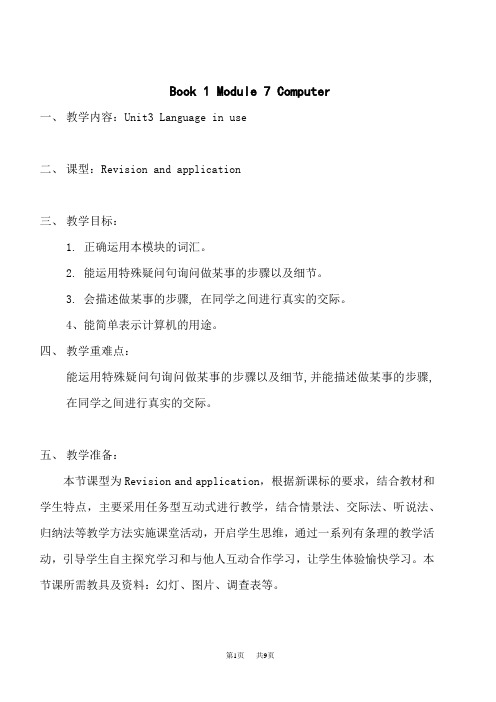
Book 1 Module 7 Computer一、教学内容:Unit3 Language in use二、课型:Revision and application三、教学目标:1. 正确运用本模块的词汇。
2. 能运用特殊疑问句询问做某事的步骤以及细节。
3. 会描述做某事的步骤, 在同学之间进行真实的交际。
4、能简单表示计算机的用途。
四、教学重难点:能运用特殊疑问句询问做某事的步骤以及细节,并能描述做某事的步骤, 在同学之间进行真实的交际。
五、教学准备:本节课型为Revision and application,根据新课标的要求,结合教材和学生特点,主要采用任务型互动式进行教学,结合情景法、交际法、听说法、归纳法等教学方法实施课堂活动,开启学生思维,通过一系列有条理的教学活动,引导学生自主探究学习和与他人互动合作学习,让学生体验愉快学习。
本节课所需教具及资料:幻灯、图片、调查表等。
六、教学过程:theandtheto dialoguesto homework 1.The students act out the dialogues in pairs about how to write homework on a compute r with the pictu res.thedoandthethedoandthe OrganizationOrganizationthe 1.Match the questions with the answers. Then check the answers with the partners.plete the conversations.3. T hey will have a match for writing on the blackboard. (See which group can write the most correct sentences of the four groups.)4. Two students will collect the sentences on the blackboard. Andstudents doActivity 3 andthe n check theanswers.6.Ask thestudents towrite questionswith the wordsin the form.answersWhat/ do onthe computerH ow/ open adocument1.Students interviewtheir best friendsabout using acomputer. They use thequestions in the formabove and write downtheir best friends’information2. Make a report abouttheir best friends’answers, using theinformation in theform. Then share withthe class.3. Ask the students to write about their using a computerwith” first, next, then, finally…”4. Organization.1.Get the students to sum up the language points.T: What have we learned toda y?Ss:……2.Let theWrite an email to your best friend about their using acomputer with” first, next, then, finally…”Module 7 ComputerUnit 3 Language in use 小组评价First, next, then, finally,… T1T2 T3I usually/ sometimes/ d on’t usually…?What…?Where…?How often…?达标训练题一.按要求改写句子。
七年级英语上册 Module 7 Computers Unit 3 Language in use(第2课时)教案 (新版)外研版

Unit 3 Language in use第二课时(Activity 4-Activity 7)Step 1:ReviewReview the present simple tense.Step 2:Practice1.Have students read through the words and the sentences in Activity 4.2.Ask students to complete the sentences with the correct form of the words from the box.check,like,plan,talk,use(1)Tom ________ his email every Saturday.(2)I have a computer,but I don't ________ it.(3)Come to my office.Let's ________ for our holiday.(4)My mother doesn't ________ computer games.(5)I can ________ to my friends on the Internet.3.Call back the answers from the whole class,and check the answers.Keys:(1)checks (2)use (3)plan (4)like (5)talk4.Have students read the sentences aloud.Step 3:Around the worldThe first computer1.Get students to read this passage.Before reading,teach the key words and phrases.2.Then ask a few students to read it,and translate it into Chinese at last.3.Solve the problems which the students met in reading.4.Read the passage together.Step 4:Module taskMaking a survey about computers1.Work in groups of three.Write questions about students and computers.2.3.Work with the whole class.Ask and answer questions in Activity 5,and make notes.4.Work in your group.Make a survey about students and e the notes you made in Activity 6 to help you.Seven students each have a computer at home.Five students each use a computer for the ir homework…Step 5:Homework1.Finish the writing.2.Revise the whole module.Blackboard DesignUnit 3Language in use (Activity 4-Activity 7)check use plan like talk1。
七年级上册Module 7 Unit 3 Language in use教学设计
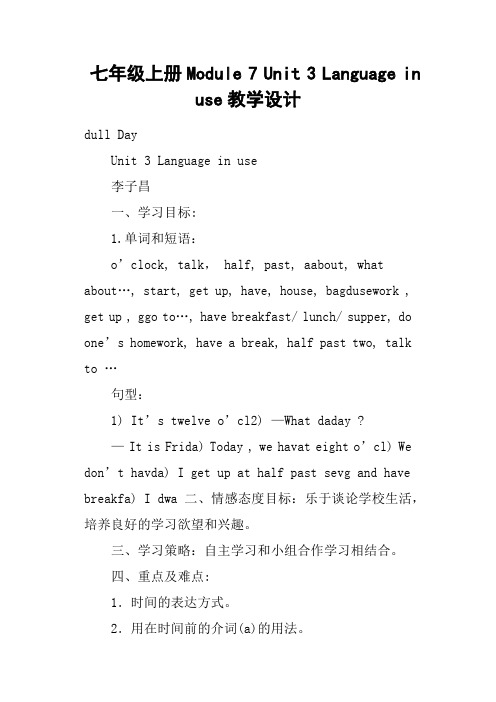
七年级上册Module 7 Unit 3 Language inuse教学设计dull DayUnit 3 Language in use李子昌一、学习目标:1.单词和短语:o’clock, talk, half, past, aabout, what about…, start, get up, have, house, bagdusework , get up , ggo to…, have breakfast/ lunch/ supper, do one’s homework, have a break, half past two, talk to …句型:1) It’s twelve o’cl2) —What daday ?—It is Frida) Today , we havat eight o’cl) We don’t havda) I get up at half past sevg and have breakfa) I dwa二、情感态度目标:乐于谈论学校生活,培养良好的学习欲望和兴趣。
三、学习策略:自主学习和小组合作学习相结合。
四、重点及难点:1.时间的表达方式。
2.用在时间前的介词(a)的用法。
3.一般现在时的陈述句形式(主语为I, they,we, you)。
4.And 连接的两个简单句。
五、学习过程:RevReview the text of Unit 1 and Unit 22 Language praRead through the examplbox wwhole cla2. AudaboxGrammar : TlWaA . Audalk abouweekendB. Wabout Ja(图见P46)Look auack’s school day .2. Read througases wwhole claAudllblank individuallwith a paall back the answwhole claanswAnswers :get up , get up 2. gl ,don’t gl3. have lunch ,don’t have lunch4. leave school ,don’t leave school5. play basketball , don’t play basketballlwith aReview the using of at , in and2. Audllblank individuallwith a paall back the answwhole claanswAnswers :2aatD. Make phrases with do, have or gAudllblank individuallwith a pa2. Call back the answwhole claanswAnswers :ave 2. do 3. go 4. have 5. have 6. do 7. go 8. gReadases wwhole claImportant and difficul.时间的表达方式。
Module 7 Unit 3《Language in use》课件1(24页)(外研

There were few doctors, so he had to work very hard. They’re starting again, so be quiet!
Complete the passage. Use so, so that or because.
Yang Liwei joined the space programme because he wanted to be an astronaut. He trained for five years (1) _so__t_h_a_t he could become an astronaut. People on Earth watched TV (2) _so__t_h_a_t they could see his space flight.
Choose the correct words to complete the sentences.
1. It was only a reason / an excuse. It wasn’t true.
2. We like/ look forward to hearing Sally play in the concert next Saturday.
We can only (5) _im__a_g_i_n_e life during the war. He saw terrible things, but we know that his hard work saved many soldiers. It’s only a (n) (6) _g_u_e_ss_, but I think Norman Bethune (7) l_o_o_k_e_d__fo_r_w__a_rd__t_o the end of the war. When we watched a film about Norman Bethune, people (8) _s_to_o_d__u_p and clapped at the end.
Module 7 Unit 3 Language in use教案(含教学反思)
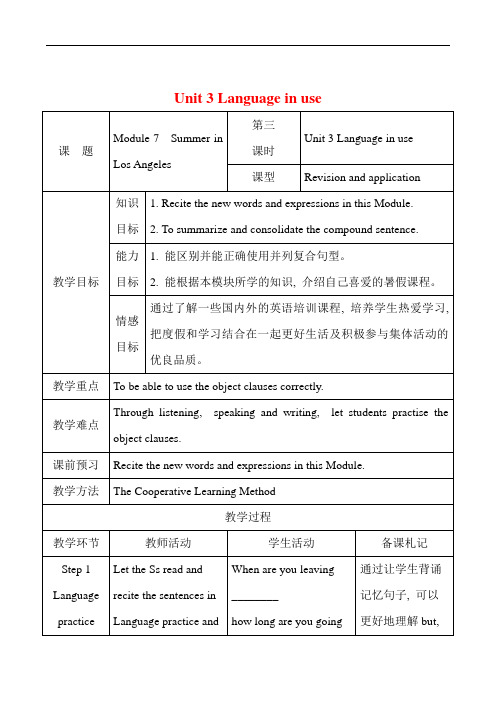
Step 2
Free talk
1. Have a free talk with students.
Summer holiday is coming. Where are you going?
2. Play a game.
Have the students make sentences with“but, and, or”one by one about travelling in groups .
5. Complete the conversation with the words and expressions in the box. (Activity 6)
6. Have the students listen to the tape and answer the questions. (Activity 7) Then call back the answers.
5. Complete the conversation with the words and expressions in the box. (Activity 6)
6. Listen and answer the questions. (Activity 7) Then check the answers.
教学重点
To be able to use the object clauses correctly.
教学难点
Through listening, speaking and writing, let students practise the object clauses.
课前预习
外研版七年级英语上册教案:Module7Unit3Languageinuse

教学内容与课本紧密关联,旨在帮助学生巩固所学知识,提高英语实际运用能力。
二、核心素养目标
1.提升学生英语语言能力:通过学习本节课内容,使学生能够熟练运用一般现在时和现在进行时描述日常活动和正在进行的动作,提高学生的英语表达和沟通能力。
2.培养学生的跨文化交际意识:让学生在掌握目标语言的基础上,了解并尊重不同文化背景下的日常活动差异,提升学生的国际视野。
外研版七年级英语上册教案:Module7 Unit 3 Language in use
一、教学内容
外研版七年级英语上册教案:Module 7 Unit 3 Language in use
本节课主要围绕Module 7 Unit 3 Language in use展开,内容包括:
1.复习和巩固一般现在时和现在进行时的用法。
(二)新课讲授(用时10分钟)
1.理论介绍:首先,我们要了解一般现在时和现在进行时的基本概念。一般现在时用于描述习惯性动作或经常发生的事情,而现在进行时则用于描述说话时正在进行的动作。了解这两个时态对于准确表达非常重要。
2.案例分析:接下来,我们通过一个具体的案例来展示这两个时态在实际中的应用。案例中的人物正在做不同的事情,我们将学习如何正确使用时态来描述这些动作。
3.重点难点解析:在讲授过程中,我会特别强调一般现在时和现在进行时的区别,以及如何正确变换句型和动词形式。对于难点部分,我会通过对比和实际例子来帮助大家理解。
(三)实践活动(用时10分钟)
1.分组讨论:学生们将分成若干小组,每组讨论一个与描述正在进行的动作相关的实际问题。
2.实验操作:为了加深理解,我们将进行一个简单的角色扮演活动。学生们将模拟不同的场景,用英语描述正在进行的动作。
七年级英语上册Module7Unit3Languageinuse课件
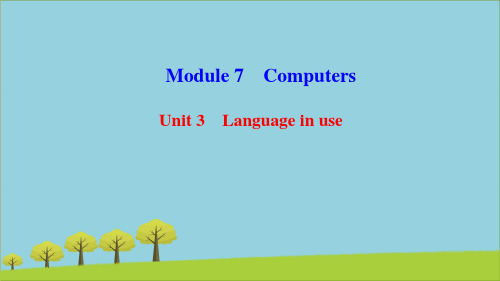
二、单项选择。
16.Read the text __A__ and then answer the questions.
A.first
B.next
C.third
D.finally
17.I'm going to use the computer.Can you __B__?
A.turn on it B.turn it on
A.check B.open C.see D.get
19.What can I use __C__ my homework? A.print B.printer C.to print D.printing 20.Sam __D__ his homework in the evening. A.don't B.doesn't C.don't do D.doesn't do 21.My sister likes _B___.She wants to be a ________. A.write;writing B.writing;writer C.write;to write D.writing;write 22.I often write __B__ my pen friend. A.for B.to C.of D.with
六、任务型阅读。 Tom:What do you do on the computer,Liu Ying?Do you use the Internet? Liu Ying:Yes,I use the Internet.I download music.I often visit websites(网 站) to get information for my homework.It's great! Tom:What about your parents? Liu Ying:My father often reads lots of news on the Internet.My mother sometimes listens to some popular songs.My parents never play computer games on the computer. Tom:Do you send emails?
Moudle7 Unit 3 Language in use第二课时课件

Do you think I should read The Arabian Nights?
Yes, I do. I think... / No, I don't. I think ...
Talking
8.Work in groups. Prepare a talk.
• Read the statement: We are more influenced by films than books. • Think of some films or books you have seen or read. How did they influence you? • Decide on your point of view. Do you agree or disagree with the statement? • Make notes about why you agree or disagree with the statement.
Presentation
5 plete the conversation with the correct form of the expressions in the box.
all over the world be not afraid of get into trouble grow up in the middle of join in look for James: I think people who write for a job are not as important as they used to be. There are many(3) _w__r_it_e_r_s_ now, but they write on the Internet for free.
Module7Unit3Languageinuse课件(第二课时)英语八年级上册

Write a short story about your own experience during this summer vocation.
课后作业
1.完成课后习题。 2.回顾本节课内容。
1.(选择)Where was Alice? A
A. She was sitting with her sister by the river. B. She was in the field(田地).
2. (选择)What kind of books did Alice like? B
A
B
3. Who ran by suddenly? Suddenly a rabbit ran by.
For example, in China today people still love old stories like The Monkey King.
Some people say that new stories written in books today are not as entertaining as the old ones. Do you agree?
Writing a short story about your own experience
Think about: • when it happened • what you were doing at the time • what happened first • what happened next • what happened finally
...
Writing a short story about your own experience
Think about: • when it happened • what you were doing at the time • what happened first • what happened next • what happened finally
Module 7 Unit3 Language in use 教案新部编本

教师学科教案[ 20 – 20 学年度第__学期]任教学科:_____________任教年级:_____________任教老师:_____________xx市实验学校Module 7 Unit3 Language in use教案ⅠTeaching modelRevision and application.ⅡTeaching methodFormal and interactive practice, task-based activities.ⅢTeaching ObjectivesTo summarize and consolidate.ⅣTeaching aidsPPT, tape recorder, handouts.ⅤTeaching StepsStep 1 Revision1. Review the text of Unit2.2. Grammar learning.Step 2 Language practiceWork in pairs. Compare the sentences below with the sentences in the grammar box above.1. Many people still read their works today.2. Confucius’s ideas still influence us.3. People all over the world still read and loved it.Step 3 Work in pairsTalk about the best stories to read.A: What stories should I read?B: I think…A: Do you think I should read The Arabian Nights?B: Yes, I do. I think…/ No, I don’t. I think…Step 4 Check up1. Complete the sentences with the correct form of the words in the box.2. Complete the sentences with the correct form of the expressions in the box.3. Listen and choose the correct answer.4. Read the passage and choose the best title.Step 5 Module task1. Work in groups. Prepare a talk.Read the statement: We are more influenced by films than books.Think of some films or books you have seen or read. How did they influence you? Decide on your point of view. Do you agree or disagree with the statement? Make note about why you agree or disagree with the statement.2. Plan your talk.Plan what you want to say.Make notes about your ideas.3. Present your talk to the class. Use your notes to help you.Step 6 HomeworkFinish the exercises in the workbook.。
外研版七上英语 Module 7 Unit 3 Language in use教学设计
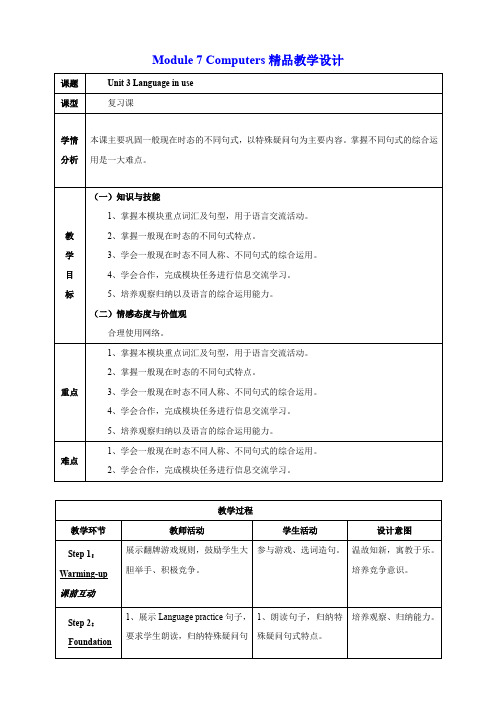
5、培养观察归纳以及语言的综合运用能力。
难点
1、学会一般现在时态不同人称、不同句式的综合运用。
2、学会合作,完成模块任务进行信息交流学习。
教学过程
教学环节
教师活动
学生活动
设计意图
Step 1:
Warming-up
课前互动
展示翻牌游戏规则,鼓励学生大胆举手、积极竞争。
5、快速阅读Around the world.观看计算机发展史视频。
6、小组完成Activities 5--6表格并记下被采访学生的答案。然后以书面形式做小组汇报。
7、跟读模块单词录音,参与记忆游戏。
培养观察、归纳能力。
培养观察能力,巩固一般现在时的特殊疑问句式。
培养合作探究能力,掌握否定句式的特点。
3、学会一般现在时态不同人称、不同句式的综合运用。
4、学会合作,完成模块任务进行信息交流学习。
5、培养观察归纳以及语言的综合运用能力。
(二)情感态度与价值观
合理使用网络。
重点
1、掌握本模块重点词汇及句型,用于语言交流活动。
2、掌握一般现在时态的不同句式特点。
3、学会一般现在时态不同人称、不同句式的综合运用。
培养独立思取长补短,相互学习。
词汇巩固
Step 3:
Practice
实战演练
展示随堂练习。
运用本节课知识,解决问题。
运用巩固
Step 4
Homework
课后巩固
布置作业
交换阅读Activity 7的各小组调查汇报,朗读交流。
能力创新。
板书设计
Unit 3 Language in use
参与游戏、选词造句。
Module 7 Unit 3 Language in use (共44张)精品课件

1. 时间的表达方式。 1) 直接表示时间法:就是按照几点几分 的顺序来表示时间。(这个最简单)例 如: 8:00——eight o’clock
5:20——five twenty 2) 添加介词表示法:如果分数小于或等 于30,就用past来表示,结构是“分钟 +past+该点钟”;如果分钟大于30,就 用to来表示,结构是“分钟+to+下一点钟”
另外,at还可以用在at night(在晚上), at last(最后),at weekends(在周末) at noon(在中午)等固定短语中。 on 常用来表示“在某天或星期几”。另外, 表示“在某天的上、下午或晚上”时, 介词也用on。
如:on Sunday(在星期天), on weekends(在周末), on February 8th(在二月八日), on Monday morning(在星期一上午), on the afternoon of November 21st(在十 一月二十一日下午) on a cold winter evening(在一个寒冷冬 天的夜晚)
PPT素材:./sucai/ PPT图表:./tubiao/ PPT教程: ./powerpoint/ 范文下载:./fanwen/ 教案下载:./jiaoan/
PPT课件:./kejian/ 数学课件:./kejian/shuxue/ 美术课件:./kejian/meishu/ 物理课件:./kejian/wuli/ 生物课件:./kejian/shengwu/ 历史课件:./kejian/lishi/
二、人称的划分
1. 第一人称: I, we 第二人称: you 第三人称: he, she, it, they, Millie…
- 1、下载文档前请自行甄别文档内容的完整性,平台不提供额外的编辑、内容补充、找答案等附加服务。
- 2、"仅部分预览"的文档,不可在线预览部分如存在完整性等问题,可反馈申请退款(可完整预览的文档不适用该条件!)。
- 3、如文档侵犯您的权益,请联系客服反馈,我们会尽快为您处理(人工客服工作时间:9:00-18:30)。
1,No pains,no gains. 2,Never giv试着表演Activity8???
revision
翻译下面的句子 1,我昨天的这个时候正在读英语 2,我看见他时他正朝我们微笑 3,他小时候常做错事 4,在茶话会上没有什么奇怪的东西 5,我在考虑买一份礼物给妈妈
A. swim
C. will swim
B. swam
D. was
swimming
Read the conversation in Activity 8 and act it out.
Storie s
Stories In the past, not many people could read or write, so people listened to stories. Some stories were popular, and they changed every time someone told them. The stories passed from generation to generation. Finally, someone wrote them down.
Writing a short story about your own experience Make notes about your story. Think about: • when it happened • what you were doing at the time • what happened first • what happened next • what happened finally
复习现在完成时 1. — What were you doing this time yesterday?
— I __________ on the grass and
drawing a picture.
A. sit
C. am sitting
B. sat
D. was sitting
2. — Where were you at 7:00
revision
1,I was reading English at this time yesterday. 2,When I saw him he was smiling at us. 3,He often do something wrong when he was a child. 4,There was nothing strang in the tea party 5,I was thinking about buying a gift for my mother.
Possible answer: It was a Friday evening. I was waiting at the bus stop after school when a car stopped and the driver opened the door. It was my father. “Quick, get in!” he told me. I was very surprised, but I did as he said. At first, I was worried that something bad had happened. Then, I noticed my mother.
For example, in China today people still love old stories like The Monkey King. Some people say that new stories written in books today are not as entertaining as the old ones. Do you agree?
Did my parents have a big surprise
for me? We were going somewhere
special-but where? The next thing I
can remember is falling asleep.
When I woke up, I saw the sea. We
She was also in the car and on the back seat, there were some bags of clothes and some food. My father was driving out of the town. “Where are we going?” I asked. It was a warm evening and lots of people were walking along the road. It was the last day of term.
last night?
— I __________ to my mom
at home.
A. write
B. was writing
C. wrote
3. — I called you at 4:00 yesterday afternoon, but no one answered? — Sorry, I _______ with my friends at that time.
Friday evening Waiting at the bus stop A car stopped … Write the story. Use your notes to help you. It was a Friday evening. I was waiting at the bus stop… Work in pairs. Discuss and revise your story. Read your story to your classmates.
